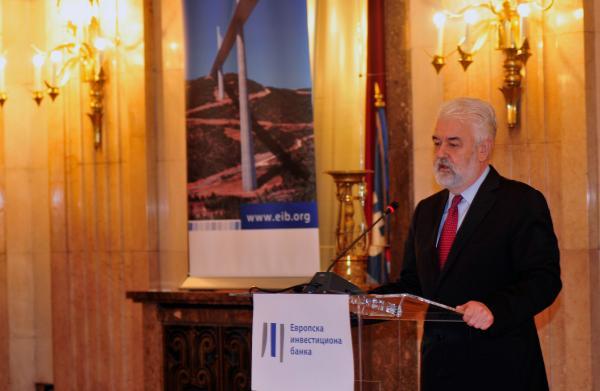
Loans totalling EUR 325 million signed for infrastructure and energy sectors
The European Investment Bank (EIB) has opened a new regional representation office in Belgrade today. At the official inauguration ceremony the EIB was represented by its President, Philippe Maystadt and Vice-President, Dario Scannapieco who is responsible for operations in the Western Balkans; the Prime Minister, Mirko Cvetković and the Deputy Prime Minister, Bozidar Djelic were present for the occasion.
“The opening of this office has significance in two respects today: on the one hand, to increase EIB activity in the region; on the other, to stress the commitment by European institutions to support your countries in joining the European Union” noted EIB President Maystadt.
After the opening ceremony, three different loans totalling EUR 325 million were signed:
-Corridor X (E-80) Motorway phase I. EUR 195 million.
Construction of a new 36 km section of motorway on the Pan-European Corridor X in Serbia between Nis and Ciflik. The project is co-financed by the World Bank, EBRD and the Serbian Government.
-Belgrade City Sava Bridge. EUR 90 million.
Second tranche of 90 million of a EUR 160 million approved loan for the construction of access roads to the new Sava Bridge in the Serbian capital Belgrade. The first EUR 70 million tranche was signed last December. The project is co-financed by EBRD and the City of Belgrade.
-EPS electronic meters. EUR 40 million.
The project involves the replacement of around 5% of the existing obsolete electro-mechanic meters by digital meters integrated into a remote reading and connection/disconnection system within Elektroprivreda Srbije. The project is co-financed by EBRD and EPS.
“The EIB is one of the largest investors in the Republic of Serbia and since 2001 has supported projects in private and public sector with around 3 billion EUR. The Bank has financed very important projects in infrastructure, as well as energy but also education and health sector as well as the development of small and medium enterprises. The opening of the EIB regional office in Belgrade will further strengthen the relationship of Serbia and the EIB, while further support of this financial institution will help countries of the Western Balkans in fulfilling their strategic goals such as increase of competitiveness and accession to the EU", the Serbian Prime minister Cvetković said.
“The three loans signed this morning confirm that the EIB is close to Serbia, to your municipalities and to the companies active in the region. An efficient infrastructure system is the backbone for the recovery and is essential to improving living conditions and economic standards of the population", noted EIB Vice-President Scannapieco.
“With the opening of its regional office in Belgrade, the European Investment Bank is confirming the clear European path of the Republic of Serbia. Moreover, after years of investing in our road and railway infrastructure, the Bank has now also recognised the goal of Serbia to become a knowledge-based economy. As a result of this, in 2010, the first €200 million for R&D infrastructure and an additional €50 million for education have been approved", noted the Serbian Deputy Prime Minister Djelic.
Notes to editors:
The EIB
The EIB is the bank of the European Union. Founded in 1958 under the Treaty of Rome, it operates in the 27 EU Member States and more than 130 other countries. In 2009, it signed loans totalling EUR 79 billion, with 95% of its financing for projects within the Member States, EFTA, Candidate and Potential Candidate countries. It is the largest supranational borrower and lender in the world and the only international financial institution politically accountable to EU policymakers and institutions.
The EIB has been active in the Western Balkans and in Croatia since 1977 and is today the largest international financier in the region. Over the past ten years, the bank has financed projects totalling EUR 7 billion in the area. Since 2001, EIB signed in total EUR 3 billion loans in Serbia.
The EIB focus in the Western Balkans
In the late 1990’s financing focused on urgent reconstruction and repairs of war-damaged infrastructures. Thereafter, EIB loans were earmarked for the modernisation and upgrading of the national transport and energy infrastructure supporting the competitiveness of the economy. Over the last five years, the EIB has diversified its lending into new sectors, such as health, education and research and development. It has also increased its support to SMEs and local authorities through lines of credit with local banks and leasing companies. To support candidate countries and potential candidate countries, the EIB also offers lending without a State guarantee for corporate-sector finance, project finance, as well as technical assistance, and innovative financial instruments.

Photographer: EIB ©To be defined
Download original